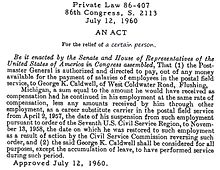Public and private bills
The examples and perspective in this article may not represent a worldwide view of the subject. (February 2024) |
Proposed bills are often categorized into public bills and private bills. A public bill is a proposed law which would apply to everyone within its jurisdiction. A private bill is a proposal for a law affecting only a single person, group, or area, such as a bill granting a named person citizenship or, previously, granting named persons a legislative divorce.
Private law can afford relief from another law, grant a unique benefit or powers not available under the general law, or relieve someone from legal responsibility for some allegedly wrongful act. There are many examples of such private law in democratic countries, although its use has changed over time. A private bill is not to be confused with a private member's bill, which is a bill introduced by a "private member" of the legislature rather than by the ministry.
In modern practice, private bills are mixed and have both private and public aspects. In such cases the proposed legislation is called a hybrid bill.[1] Some public laws set out such narrow terms of applicability that they apply to only one person or organization, making them de facto private laws. This may be used (successfully or unsuccessfully) to get around prohibitions on certain kinds of public laws.
United Kingdom
[edit]Public bills are the most common bills introduced in the Parliament of the United Kingdom. If they are enacted, they become public general acts (in contrast with local and personal acts).
Private bills create two types of act of Parliament in the United Kingdom. The first are acts for the benefit of individuals (known as private or personal acts) which have historically often dealt with divorces or granting British nationality to foreigners, but in modern times are generally limited to authorising marriages which would otherwise not be legal.[2] The most recent such act was made in 1987.
The second type are public acts for the benefit of organisations, or authorising major projects such as railways or canals, or granting extra powers to local authorities (known as local acts).[3] Private bills were used in the nineteenth century to create corporations and grant monopolies. They are still used in relation to large infrastructure projects, such as HS2, where law is being created primarily to give effect to rights and powers being exercised by a private (even if largely state owned) entity.[4]
There is another classification known as a hybrid instrument which shares characteristics of both public and private bills. Hybrid bills become public acts.
Canada
[edit]Divorce in Canada prior to the passage of the Divorce Act of 1968 was sometimes handled by private laws.[5] If unavailable by administrative or judicial means, it was possible to obtain a legislative divorce by application to the Senate of Canada, which reviewed and investigated petitions for divorce, which would then be voted upon by the Senate and subsequently made into law.
United States
[edit]
Public bills are the most common type of law in the United States.
The Constitution of the United States prohibits bills of attainder in both state and federal legislatures, meaning private laws cannot be used to punish any specific individual or organization. This does not prohibit private laws which are favorable to a person or corporation.
In the United States, private bills were previously common. However, federal agencies are now able to deal with most of the issues that were previously dealt with under private bills as these agencies have been granted sufficient discretion by the United States Congress to deal with exceptions to the general legislative scheme of various laws. The kinds of private bills that are still introduced include grants of citizenship to individuals who are otherwise ineligible for normal visa processing; alleviation of tax liabilities; armed services decorations; and veteran benefits.[examples needed]
See also
[edit]- Private member's bill – In some parliaments a bill introduced by a member not on behalf of the executive government
- List of beneficiaries of immigration/nationality-related United States Private Bills/Laws
References
[edit]- ^ "Hybrid Bills". UK Parliament. Retrieved 2019-02-01.
- ^ Chronological Table of the Private and Personal Acts Part 33 (1910-1987), Office of Public Sector Information – retrieved 23 May 2009
- ^ Chronological Tables of Local Acts Part 187 (1989-2003), Office of Public Sector Information – retrieved May 23, 2009
- ^ "Private Bills". UK Parliament. Retrieved 2022-10-13.
- ^ "Divorce Law in Canada (96-3e)". Government of Canada Publications. Retrieved 2019-02-01.
